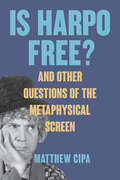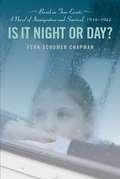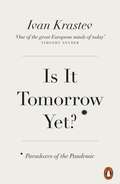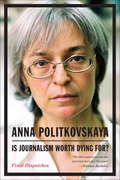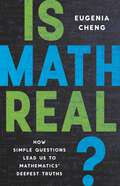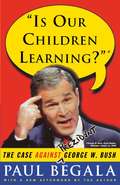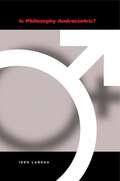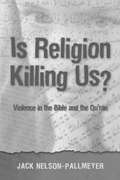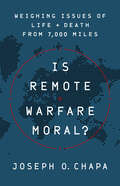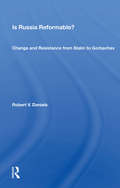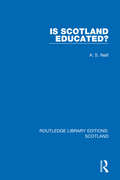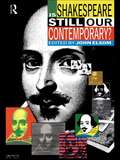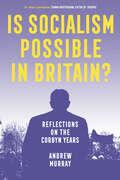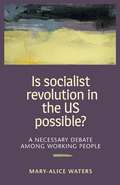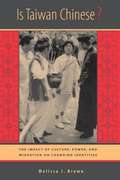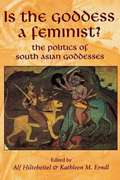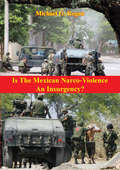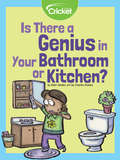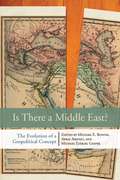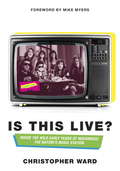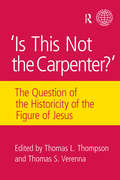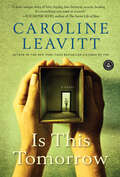- Table View
- List View
Is Harpo Free?: And Other Questions of the Metaphysical Screen (SUNY series, Horizons of Cinema)
by Matthew CipaIs Harpo Free? is a lively appreciation of film and television's ability to artistically explore concepts typical of philosophical metaphysics, such as free will, causality, and personal identity. Rather than using films and television programs as vehicles for philosophical arguments, the book instead celebrates the artistic ways in which they give life to various metaphysical concepts and how the artistic expression of these concepts and ideas helps us understand ourselves, the world, and our place within it. Through close analysis of a varied selection of works and their use of narrative, form, and style, Is Harpo Free? exemplifies a novel approach to appreciating the philosophical substance of films and television programs. Films and television programs discussed include A Night at the Opera; Run, Lola, Run; Shane; Harvey; Three Colours: Blue; The Americans; Dark; and Fargo.
Is It Just?
by Lori Chambers Jenny Roth Minnie SmithMinnie Smith's (ca. 1874-1933) feminist domestic novel, Is It Just?, is a harsh critique of the injustices perpetuated by male-dominated society and law. Published in 1911, it tells the tragic story of Mary Pierce, who, through the actions of her selfish and lazy husband, loses her land, her social standing, and ultimately her life.In Is It Just?, the conventions of the domestic novel - episodic presentation, stock characters, contrived plots, and romantic conclusions - illustrate the superiority of female values and argue for expanded social, political, and legal rights for women. A critical introduction by Jenny Roth and Lori Chambers frames Smith's specific references to the laws and social geography of British Columbia, situating the novel in relation to its historic and literary importance. This unique work of domestic literature adds to our limited library of Canadian feminist writings of the first wave.
Is It Night or Day?
by Fern Schumer ChapmanIn 1938, Edith Westerfeld, a young German Jew, is sent by her parents to Chicago, Illinois, where she lives with an aunt and uncle and tries to assimilate into American culture, while worrying about her parents and mourning the loss of everything she has ever known. Based on the author's mother's experience, includes an afterword about a little-known program that brought twelve hundred Jewish children to safety during World War II.
Is It Tomorrow Yet?: Paradoxes of the Pandemic
by Ivan KrastevA FINANCIAL TIMES BOOK OF THE YEAROne of our most scintillating public intellectuals explores the political paradoxes of the pandemic and helps us think our way through it'We are able to imagine anything because we are being besieged by something that was considered unimaginable...'Beneath the panic and bluster, beneath the confusing speeches and the conflicting advice, the Coronavirus pandemic acted, changing our world in the most profound ways. The tragic human cost and the economic devastation will be assessed and calculated for decades to come. But the pandemic also changed things in ways that are less easily expressed and understood. It has made bare the frayed contradictions of modern life. It has distorted things that seemed simple and settled. It has affirmed plain, uncomfortable truths. In this brilliant, thought-provoking essay, Ivan Krastev, one of our most interesting thinkers today, explores the pandemic's immediate consequences and conceives of its long-term legacy. Will things be different for the communities most harmed, and for those who escaped the worst? Where are we now with the US and China, with the UK and Europe? And how do we think our way through the unthinkable?
Is Journalism Worth Dying For? Final Dispatches
by Anna Politkovskaya Arch TaitA collection of final dispatches by the famed journalist, including the first translation of the work that may have led to her murder. Anna Politkovskaya won international fame for her courageous reporting. Is Journalism Worth Dying For? is a long-awaited collection of her final writing. Beginning with a brief introduction by the author about her pariah status, the book contains essays that characterize the self-effacing Politkovskaya more fully than she allowed in her other books. From deeply personal statements about the nature of journalism, to horrendous reports from Chechnya, to sensitive pieces of memoir, to, finally, the first translation of the series of investigative reports that Politkovskaya was working on at the time of her murder--pieces many believe led to her assassination. Elsewhere, there are illuminating accounts of encounters with leaders including Lionel Jospin, Tony Blair, George W. Bush, and such exiled figures as Boris Berezovsky, Akhmed Zakaev, Vladimir Bukovsky. Additional sections collect Politkovskaya's non political writing, revealing her delightful wit, deep humanity, and willingness to engage with the unfamiliar, as well as her deep regrets about the fate of Russia.
Is Math Real?: How Simple Questions Lead Us to Mathematics' Deepest Truths
by Eugenia ChengOne of the world&’s most creative mathematicians offers a &“brilliant&” and &“mesmerizing&” (Popular Science) new way to look at math—focusing on questions, not answers Winner of the Los Angeles Times Book Prize and a New Scientist Best Book of the Year Where do we learn math: From rules in a textbook? From logic and deduction? Not really, according to mathematician Eugenia Cheng: we learn it from human curiosity—most importantly, from asking questions. This may come as a surprise to those who think that math is about finding the one right answer, or those who were told that the &“dumb&” question they asked just proved they were bad at math. But Cheng shows why people who ask questions like &“Why does 1 + 1 = 2?&” are at the very heart of the search for mathematical truth. Is Math Real? is a much-needed repudiation of the rigid ways we&’re taught to do math, and a celebration of the true, curious spirit of the discipline. Written with intelligence and passion, Is Math Real? brings us math as we&’ve never seen it before, revealing how profound insights can emerge from seemingly unlikely sources.
Is Our Children Learning?: The Case Against George W. Bush
by Paul Begala"Is Our Children Learning?" examines the public life and public record of George W. Bush.
Is Philosophy Androcentric?
by Iddo LandauIn Is Philosophy Androcentric?, Iddo Landau contends that none of the arguments for viewing philosophy as pervasively androcentric ultimately stand up to rational scrutiny, while the ones that show it to be nonpervasively androcentric do not undermine it in the way that many critics have supposed. “Philosophy emerges, in almost all of its parts,” he concludes, “as human rather than male, and most parts and aspects of it need not be rejected or rewritten."
Is Religion Killing Us?: Violence in the Bible and the Quran
by Jack Nelson-PallmeyerNelson-Pallmeyer explores the ways in which the sacred texts of Christianity, Judaism, and Islam seemingly justify violence against enemies in the service of God's will. He challenges the understanding of power that lies at the heart of the Bible and the Quran, arguing that nonviolence is crucial to the future of humanity and that the abusive visions of power presented in sacred texts should be challenged.
Is Remote Warfare Moral?: Weighing Issues of Life and Death from 7,000 Miles
by Joseph O ChapaAmerica is at an important turning point. Remote warfare is not just a mainstay of post–9/11 wars, it is a harbinger of what lies ahead—a future of high-tech, artificial intelligence–enabled, and autonomous weapons systems that raise a host of new ethical questions. Most fundamentally, is remote warfare moral? And if so, why? Joseph O. Chapa, with unique credentials as Air Force officer, Predator pilot, and doctorate in moral philosophy, serves as our guide to understanding this future, able to engage in both the language of military operations and the language of moral philosophy. Through gripping accounts of remote pilots making life-and-death decisions and analysis of high-profile cases such as the killing of Iranian high government official General Qasem Soleimani, Chapa examines remote warfare within the context of the just war tradition, virtue, moral psychology, and moral responsibility. He develops the principles we should use to evaluate its morality, especially as pilots apply human judgment in morally complex combat situations. Moving on to the bigger picture, he examines how the morality of human decisions in remote war is situated within the broader moral context of US foreign policy and the future of warfare.
Is Russia Reformable?: Change And Resistance From Stalin To Gorbachev
by Robert V. DanielsHistory is always full of surprises as it unfolds before us. The Soviet Union, for decades a seemingly frozen monolith of totalitarian rigidity and paranoid bellicosity, suddenly finds itself under a leader in the person of Mikhail Gorbachev who calls for "radical restructuring," openness," and even a "revolution." Outsiders justly wonder if this m
Is Science Multicultural? Postcolonialisms, Feminisms, and Epistemologies
by Sandra HardingThis book explores what the last three decades of European/American, feminist, and postcolonial science and technology studies can learn from each other. Sandra introduces and discusses an array of postcolonial science studies.
Is Scotland Educated? (Routledge Library Editions: Scotland #21)
by A. S. NeillOriginally published in 1936, and with more than a slightly tongue-in-cheek tone at times, the author of this book declares that Scotland is not educated but merely learned. This book does not deal with education in its narrowest sense: it ranges from the Kirk to Haggis, Tartans and Burns, Whisky and repressed sex in its discussion, proclaiming Calvinism as the root of most of Scotland’s evils. Honest and at times provocative, this volume does give direct access to the emotional roots of Neill’s feelings about Scottish education.
Is Shakespeare Still Our Contemporary?
by John ElsomFirst published in 2004. Routledge is an imprint of Taylor & Francis, an informa company.
Is Socialism Possible in Britain?: Reflections on the Corbyn Years
by Andrew MurrayThe lessons of the Corbyn years for the future of left politicsIs Socialism Possible in Britain? analyses Jeremy Corbyn&’s tenure as Labour leader and the prospects for parliamentary socialism in a post-Corbyn Britain. Lively and insightful, it is informed by an insider&’s view of the most radical period in Labour&’s history. A veteran of the Stop the War Coalition, Andrew Murray was seconded to Corbyn&’s office from the Unite trade union and witnessed an extraordinary daily bombardment from sections of the Parliamentary Labour Party and the media. He candidly assesses the leadership&’s response to the antisemitism controversy and the dilemmas of Brexit, as well as Keir Starmer&’s restoration of a turgid neo-Blairism.The problems that beset Corbyn are likely to confront any similar political project. Is Socialism Possible in Britain? explores how they can be more effectively addressed in the future – a future which we must hope is not so far away.
Is Socialist Revolution in the Us Possible?: A Necessary Debate Among Working People
by Mary-Alice Waters Norton SandlerAn unhesitating "Yes"--that's the answer given here to the question, Is Socialist Revolution in the US Possible? Possible--but not inevitable. That future depends on us. This book is a contribution to the growing discussion among working people everywhere who are looking for a way forward in the face of sharpening capitalist crisis and spreading wars. Fighting for a society only working people can create, it is our own capacities we will discover, not the rulers' false image of us--an image that reflects their own guilt and fear.
Is Taiwan Chinese? The Impact of Culture, Power, and Migration on Changing Identities
by Melissa J. BrownIn a unique comparison of ethnographic and historical case studies drawn from both Taiwan and China, Brown's book shows how identity is shaped by social experience--not culture and ancestry, as is commonly claimed in political rhetoric.
Is The Goddess a Feminist? The Politics of South Asian Goddesses
by Alf Hiltebeitel Kathleen M. ErndlIn India, God can be female. The goddesses of Hinduism and Buddhism represent the largest extant collection of living goddesses anywhere on the planet. Feminists in the West often draw upon South Asian goddesses as theological resources in the contemporary rediscovery of the Goddess. Yet, these goddesses are products of a male supremacist society. What is the impact of powerful female deities--their images, projections, textuality, and history--on the social standing and psychological health of women? Do they empower women, or serve the interests of patriarchal culture? Is the Goddess a Feminist? looks at the goddesses of South Asia to address these questions directly. Not a book about a single goddess or even about a variety of South Asian goddesses, the volume raises questions about images of deities as symbols and the ways in which they function. Contributors discuss contemporary Indian women who have embraced goddesses as spiritually and socially liberating, as well as the seeming contradictions between the power of Indian goddesses and the lives of Indian women. They also explore such topics as the element of male desire in the embodiment of female deities, the question of who speaks for the goddesses, and the politics and theology of Western feminist use of Hindu and Buddhist goddesses as models for their feminist reflections.
Is The Mexican Narco-Violence An Insurgency?
by Michael G. RoganSince Mexican President Felipe Calderón declared war on the drug cartels in Dec. 2006, more than 35,000 Mexicans have died due to narco-violence.This monograph examines whether the various Mexican drug trafficking organizations are insurgents or organized criminal elements. Mexican narco-violence and its affiliated gang violence have spread across Mexico’s southern border into Guatemala, Honduras, and El Salvador. Additionally, the narco-violence is already responsible for the deaths of American citizens on both sides of the U.S.-Mexico border, and the potential for increased spillover violence is a major concern.This monograph argues that the Mexican drug cartels are transnational criminal organizations (TCOs) that pose a national security threat to the regional state actors; however, they are not an insurgency for four reasons. First, none of the cartels have the political aim or capability to overthrow the Mexican government. Second, the various TCOs are competing criminal organizations with approximately 90 percent of the violence being cartel on cartel. For example, the violence in the city of Juárez is largely the result of the fighting between the local Juárez cartel and the Sinaloa cartel for control of one of the primary smuggling routes into the U.S.. Third, the cartels’ use of violence and coercion has turned popular support against them thus denying them legitimacy. Fourth, although the cartels do control zones of impunity within their areas of influence, the Mexican government has captured, killed, and extradited kingpins from every major TCO.
Is There a Genius in Your Bathroom or Kitchen?
by Ellen SeidenIf you’re looking for a great invention, look no further than your bathroom or kitchen! Did you know that the first flushing toilet was invented four thousand years ago? Or that a melted chocolate bar sparked the discovery of the microwave? Learn about these great inventions and more!
Is There a Middle East?
by Michael E. Bonine Abbas Amanat Michael Ezekiel GasperIs the idea of the "Middle East" simply a geopolitical construct conceived by the West to serve particular strategic and economic interests—or can we identify geographical, historical, cultural, and political patterns to indicate some sort of internal coherence to this label? While the term has achieved common usage, no one studying the region has yet addressed whether this conceptualization has real meaning—and then articulated what and where the Middle East is, or is not. This volume fills the void, offering a diverse set of voices—from political and cultural historians, to social scientists, geographers, and political economists—to debate the possible manifestations and meanings of the Middle East. At a time when geopolitical forces, social currents, and environmental concerns have brought attention to the region, this volume examines the very definition and geographic and cultural boundaries of the Middle East in an unprecedented way.
Is This Live?: The Nation's Music Station
by Mike Myers Christopher WardFrom former VJ Christopher Ward, Is This Live? captures the pure fun and rock 'n' roll rebellion of the early years of MuchMusic. On August 31, 1984, the Nation's Music Station launched, breaking ground as the Wild (Canadian) West of television--live, gloriously unpredictable, seat-of-the-pants TV, delivered fresh daily. The dream child of TV visionary Moses Znaimer, and John Martin, the maverick creator of The New Music, Much was live and largely improvised, and an entire generation of Canadians grew up watching the VJs and embraced the new music that became the video soundtrack of our lives. The careers of Canadian legends like Blue Rodeo, Corey Hart, Jane Siberry, Bryan Adams, Platinum Blonde, Glass Tiger, Colin James, the Parachute Club, Honeymoon Suite, Barenaked Ladies, Maestro Fresh Wes and Sloan were launched when Much brought them closer to their fans. Much also gave us international acts (Duran, Duran, Tina Turner, Iggy Pop, David Bowie, Madonna, Motorhead, Guns N' Roses, Nirvana, Red Hot Chili Peppers), and covered the second wave of music activism with events like Live Aid and the Amnesty International Human Rights Now! tour. Ranging from Toronto's iconic studio at 299 Queen Street West, to Vancouver's MuchWest, MuchMusic's programming travelled across Canada and connected the Canadian music scenes in an unprecedented way. With stories of the bands, the music, the videos, the specialty shows, the style and the improvisational approach to daily broadcast life at Much, Is This Live? is told by the people who were there--the colourful cast of on-air VJs, the artists who found their way into our living rooms of the nation as never before, and the people behind the cameras. As our tour guide to the first decade at MuchMusic Christopher Ward delivers a full-on dose of pop culture nostalgia from the 1980s and '90s, when the music scene in Canada changed forever.From the Trade Paperback edition.
Is This My Love
by Gertrude E. FinneyOrphaned by the deaths of their parents by the plague in 17th century England Beatrice and Matthew are brought up by there absentminded clergymond grandfather, and somewhat strict grandmother. Being a man, Matthew is able to leave home and make his way to America. Unhappy with the marriage partner her grandparents have chosen for her, Beatrice and her friend Jennifer join over eighty other single "maids" on the brideship Bonaventure which will carry unmarried women to the Virginia colony. Though the shipboard trip is horrifying and trying of everyone's patience, the arrival is nothing like Beetee thinks it will be. Her Brother has a farm, but he doesn't have a home fit for her to live in. In the timespan of this book, she learns much about herself, makes many friends, and finds a place in which she can be useful and happy.
Is This Not The Carpenter?: The Question of the Historicity of the Figure of Jesus
by Thomas L. Thompson Thomas S. VerennaThe historicity of Jesus is now widely accepted and hardly questioned by most scholars. But this assumption disarms biblical texts of much of their power by privileging an historical interpretation which effectively sweeps aside much theological speculation and allusion. Furthermore, the assumption of historicity gathers further assumptions to it, shaping the interpretation of texts, both denying and adding subtext. Scholars are now faced with an endless array of works on the historical Jesus and few question what has been lost through this wide-spread assumption of historicity. Is This Not the Carpenter? presents a very valuable corrective: a literary rereading of the New Testament.
Is This Tomorrow: A Novel
by Caroline LeavittIn 1956, Ava Lark rents a house with her twelve-year-old son, Lewis, in a desirable Boston suburb. Ava is beautiful, divorced, Jewish, and a working mom. <P><P>She finds her neighbors less than welcoming. Lewis yearns for his absent father, befriending the only other fatherless kids: Jimmy and Rose. <P>One afternoon, Jimmy goes missing. The neighborhood—in the throes of Cold War paranoia—seizes the opportunity to further ostracize Ava and her son.Years later, when Lewis and Rose reunite to untangle the final pieces of the tragic puzzle, they must decide: Should you tell the truth even if it hurts those you love, or should some secrets remain buried?
